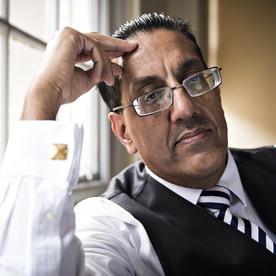Related Research Articles
In most common law jurisdictions,the attorney general or attorney-general is the main legal advisor to the government. In some jurisdictions,attorneys general also have executive responsibility for law enforcement,prosecutions or even responsibility for legal affairs generally. In practice,the extent to which the attorney general personally provides legal advice to the government varies between jurisdictions,and even between individual office-holders within the same jurisdiction,often depending on the level and nature of the office-holder's prior legal experience.
The Director of Public Prosecutions (DPP) is the office or official charged with the prosecution of criminal offences in several criminal jurisdictions around the world. The title is used mainly in jurisdictions that are or have been members of the Commonwealth of Nations.

The Crown Prosecution Service (CPS) is the principal public agency for conducting criminal prosecutions in England and Wales. It is headed by the Director of Public Prosecutions.

In the United States,a district attorney (DA),county attorney,county prosecutor,state's attorney,prosecuting attorney,commonwealth's attorney,state attorney or solicitor is the chief prosecutor and/or chief law enforcement officer representing a U.S. state in a local government area,typically a county or a group of counties. The exact and scope of the office varies by state. Generally,the prosecutor represents the people of the jurisdiction. With the exception of three states,district attorneys are elected,unlike similar roles in other common law jurisdictions.

Dame Vera Baird is a British barrister and politician who has held roles as a government minister,police and crime commissioner,and Victims' Commissioner for England and Wales.

A prosecutor is a legal representative of the prosecution in states with either the common law adversarial system or the civil law inquisitorial system. The prosecution is the legal party responsible for presenting the case in a criminal trial against the defendant,an individual accused of breaking the law. Typically,the prosecutor represents the state or the government in the case brought against the accused person.

The Crown Office and Procurator Fiscal Service is the independent public prosecution service for Scotland,and is a Ministerial Department of the Scottish Government. The department is headed by His Majesty's Lord Advocate,who under the Scottish legal system is responsible for prosecution,along with the area procurators fiscal. In Scotland,virtually all prosecution of criminal offences is undertaken by the Crown. Private prosecutions are extremely rare.

In England and Wales,a magistrates' court is a lower court which hears matters relating to summary offences and some triable either-way matters. Some civil law issues are also decided here,notably family proceedings. In 2010,there were 320 magistrates' courts in England and Wales;by 2020,a decade later,164 of those had closed. The jurisdiction of magistrates' courts and rules governing them are set out in the Magistrates' Courts Act 1980.
A police caution is a formal alternative to prosecution in minor cases,administered by the police in England and Wales. It is commonly used to resolve cases where full prosecution is not seen as the most appropriate solution. Accepting a caution requires an admission of guilt.

Karim Asad Ahmad Khan is a British lawyer specialising in international criminal law and international human rights law,who has served as Prosecutor of the International Criminal Court since 2021.
A private prosecution is a criminal proceeding initiated by an individual private citizen or private organisation instead of by a public prosecutor who represents the state. Private prosecutions are allowed in many jurisdictions under common law,but have become less frequent in modern times as most prosecutions are now handled by professional public prosecutors instead of private individuals who retain barristers.

The Attorney General's Office (AGO) is a department of His Majesty's Government that supports the Attorney General and their deputy,the Solicitor General. It is sometimes referred to as the Legal Secretariat to the Law Officers.
Oluwashijibomi "Shiji" Lapite was a 34-year-old Nigerian asylum seeker who died in the back of a police van shortly after being detained by two officers from Stoke Newington police station in London.
A Lord Advocate's Reference is a procedure by which the Lord Advocate can refer a point of law that has arisen during the course of solemn proceedings to the High Court of Justiciary sitting as the Court of Criminal Appeal,for a determination. The Lord Advocate is the senior law officer of the Scottish Government,chief public prosecutor and head of the Crown Office and Procurator Fiscal Service in Scotland.

Nazir Afzal is a British solicitor and former prosecutor within the Crown Prosecution Service (CPS).

Dame Alison Margaret Saunders,is a British barrister and a former Director of Public Prosecutions. She was the first lawyer from within the Crown Prosecution Service and the second woman to hold the appointment. She was also the second holder of this office not to be a Queen's Counsel. She was previously the Chief Crown Prosecutor for CPS London. Her term of office ended on 31 October 2018. She is now a Partner at the Magic Circle law firm Linklaters.
The New South Wales Office of the Director of Public Prosecutions (ODPP) is an independent prosecuting service and government agency within the portfolio of the Attorney General of New South Wales. Of all prosecuting services in Australia,the ODPP has the largest caseload,staff,and budget.
Sir David John Mark Green is a British lawyer and prosecutor,who served from 2012 until 2018 as the Director of the Serious Fraud Office.
Grace Ononiwu CBE,is a solicitor and Chief Crown Prosecutor,Director of Legal Services at the Crown Prosecution Service (CPS) in the UK.
Osvaldo Zavala Giler is an Ecuadorian jurist. He has been the registrar of the International Criminal Court (ICC) since 17 April 2023 and has a five-year mandate.
References
- 1 2 "About the CPS : Chief Executive". www.cps.gov.uk. Retrieved 28 February 2016.
- 1 2 "New Chief Executive appointed at the Crown Prosecution Service". www.cps.gov.uk. 19 February 2016. Retrieved 28 February 2016.
- ↑ "Crown Prosecution Service Chief Executive appointed : Press Release : Crown Prosecution Service". www.cps.gov.uk. 11 January 2007. Retrieved 28 February 2016.
- ↑ "Senior officials 'high earners' salaries as at 30 September 2015 - GOV.UK". www.gov.uk. 17 December 2015. Retrieved 28 February 2016.
- ↑ "Senior officials 'high earners' salaries as at 30 September 2016 - GOV.UK". www.gov.uk. 21 December 2016. Retrieved 3 January 2017.
- ↑ "No. 60173". The London Gazette (Supplement). 16 June 2012. p. 2.
- ↑ "Peter Lewis". International Criminal Court . Retrieved 8 September 2018.
- ↑ "Outsider Peter Lewis voted Registrar to reform the International Criminal Court". justiceinfo.net. 1 April 2018. Retrieved 8 September 2018.
- ↑ "In conversation with the new ICC Registrar, Osvaldo Zavala Giler". Diplomat Magazine. 7 May 2023. Archived from the original on 7 June 2023.
- ↑ "No. 64082". The London Gazette (Supplement). 17 June 2023. p. B3.